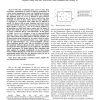Free Online Productivity Tools
i2Speak
i2Symbol
i2OCR
iTex2Img
iWeb2Print
iWeb2Shot
i2Type
iPdf2Split
iPdf2Merge
i2Bopomofo
i2Arabic
i2Style
i2Image
i2PDF
iLatex2Rtf
Sci2ools
156
click to vote
TKDE
2010
2010
Filtering Data Streams for Entity-Based Continuous Queries
The idea of allowing query users to relax their correctness requirements in order to improve performance of a data stream management system (e.g., location-based services and sensor networks) has been recently studied. By exploiting the maximum error (or tolerance) allowed in query answers, algorithms for reducing the use of system resources have been developed. In most of these works, however, query tolerance is expressed as a numerical value, which may be difficult to specify. We observe that in many situations, users may not be concerned with the actual value of an answer, but rather which object satisfies a query (e.g., "who is my nearest neighbor?"). In particular, an entity-based query returns only the names of objects that satisfy the query. For these queries, it is possible to specify a tolerance that is "non-value-based". In this paper, we study fraction-based tolerance, a type of non-value-based tolerance, where a user specifies the maximum fractions of a ...
Related Content
| Added | 22 May 2011 |
| Updated | 22 May 2011 |
| Type | Journal |
| Year | 2010 |
| Where | TKDE |
| Authors | Reynold Cheng, Benjamin C. M. Kao, Alan Kwan, Sunil Prabhakar, Yi-Cheng Tu |
Comments (0)

